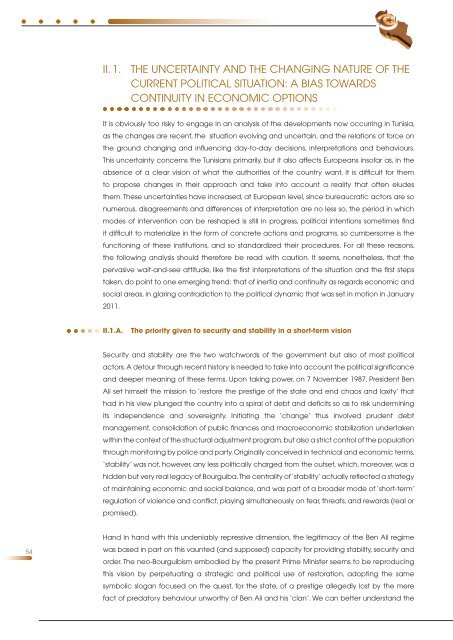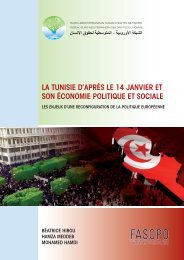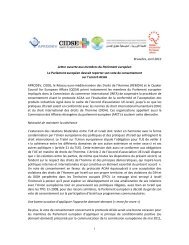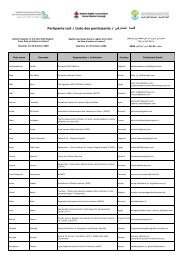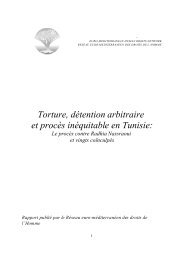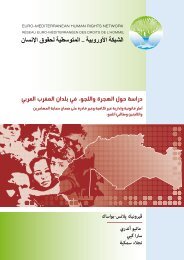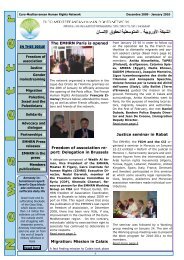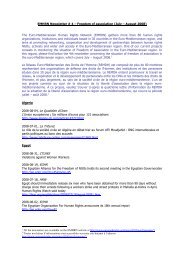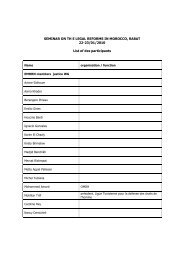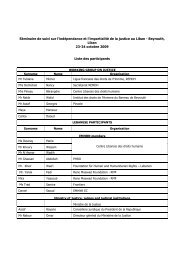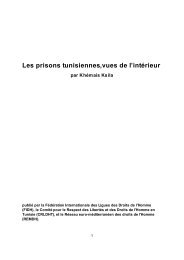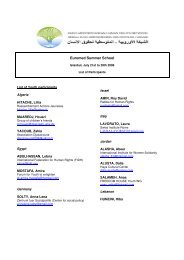tunisia after 14 january and its social and political economy - Refworld
tunisia after 14 january and its social and political economy - Refworld
tunisia after 14 january and its social and political economy - Refworld
Create successful ePaper yourself
Turn your PDF publications into a flip-book with our unique Google optimized e-Paper software.
II. 1. The uncertainty <strong>and</strong> the changing nature of thecurrent <strong>political</strong> situation: a bias towardscontinuity in economic optionsIt is obviously too risky to engage in an analysis of the developments now occurring in Tunisia,as the changes are recent, the situation evolving <strong>and</strong> uncertain, <strong>and</strong> the relations of force onthe ground changing <strong>and</strong> influencing day-to-day decisions, interpretations <strong>and</strong> behaviours.This uncertainty concerns the Tunisians primarily, but it also affects Europeans insofar as, in theabsence of a clear vision of what the authorities of the country want, it is difficult for themto propose changes in their approach <strong>and</strong> take into account a reality that often eludesthem. These uncertainties have increased, at European level, since bureaucratic actors are sonumerous, disagreements <strong>and</strong> differences of interpretation are no less so, the period in whichmodes of intervention can be reshaped is still in progress, <strong>political</strong> intentions sometimes findit difficult to materialize in the form of concrete actions <strong>and</strong> programs, so cumbersome is thefunctioning of these institutions, <strong>and</strong> so st<strong>and</strong>ardized their procedures. For all these reasons,the following analysis should therefore be read with caution. It seems, nonetheless, that thepervasive wait-<strong>and</strong>-see attitude, like the first interpretations of the situation <strong>and</strong> the first stepstaken, do point to one emerging trend: that of inertia <strong>and</strong> continuity as regards economic <strong>and</strong><strong>social</strong> areas, in glaring contradiction to the <strong>political</strong> dynamic that was set in motion in January2011.II.1.A.The priority given to security <strong>and</strong> stability in a short-term visionSecurity <strong>and</strong> stability are the two watchwords of the government but also of most <strong>political</strong>actors. A detour through recent history is needed to take into account the <strong>political</strong> significance<strong>and</strong> deeper meaning of these terms. Upon taking power, on 7 November 1987, President BenAli set himself the mission to ‘restore the prestige of the state <strong>and</strong> end chaos <strong>and</strong> laxity’ thathad in his view plunged the country into a spiral of debt <strong>and</strong> defic<strong>its</strong> so as to risk undermining<strong>its</strong> independence <strong>and</strong> sovereignty. Initiating the ‘change’ thus involved prudent debtmanagement, consolidation of public finances <strong>and</strong> macroeconomic stabilization undertakenwithin the context of the structural adjustment program, but also a strict control of the populationthrough monitoring by police <strong>and</strong> party. Originally conceived in technical <strong>and</strong> economic terms,‘stability’ was not, however, any less <strong>political</strong>ly charged from the outset, which, moreover, was ahidden but very real legacy of Bourguiba. The centrality of ‘stability’ actually reflected a strategyof maintaining economic <strong>and</strong> <strong>social</strong> balance, <strong>and</strong> was part of a broader mode of ‘short-term’regulation of violence <strong>and</strong> conflict, playing simultaneously on fear, threats, <strong>and</strong> rewards (real orpromised).54H<strong>and</strong> in h<strong>and</strong> with this undeniably repressive dimension, the legitimacy of the Ben Ali regimewas based in part on this vaunted (<strong>and</strong> supposed) capacity for providing stability, security <strong>and</strong>order. The neo-Bourguibism embodied by the present Prime Minister seems to be reproducingthis vision by perpetuating a strategic <strong>and</strong> <strong>political</strong> use of restoration, adopting the samesymbolic slogan focused on the quest, for the state, of a prestige allegedly lost by the merefact of predatory behaviour unworthy of Ben Ali <strong>and</strong> his ‘clan’. We can better underst<strong>and</strong> the


